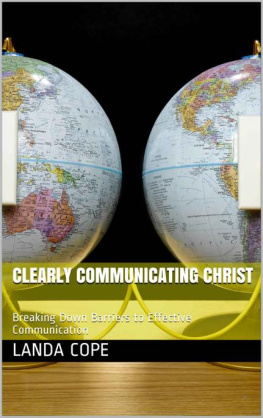De Landa - A New Philosophy of Society
Here you can read online De Landa - A New Philosophy of Society full text of the book (entire story) in english for free. Download pdf and epub, get meaning, cover and reviews about this ebook. year: 2011, publisher: Bloomsbury UK, genre: Religion. Description of the work, (preface) as well as reviews are available. Best literature library LitArk.com created for fans of good reading and offers a wide selection of genres:
Romance novel
Science fiction
Adventure
Detective
Science
History
Home and family
Prose
Art
Politics
Computer
Non-fiction
Religion
Business
Children
Humor
Choose a favorite category and find really read worthwhile books. Enjoy immersion in the world of imagination, feel the emotions of the characters or learn something new for yourself, make an fascinating discovery.
A New Philosophy of Society: summary, description and annotation
We offer to read an annotation, description, summary or preface (depends on what the author of the book "A New Philosophy of Society" wrote himself). If you haven't found the necessary information about the book — write in the comments, we will try to find it.
A New Philosophy of Society — read online for free the complete book (whole text) full work
Below is the text of the book, divided by pages. System saving the place of the last page read, allows you to conveniently read the book "A New Philosophy of Society" online for free, without having to search again every time where you left off. Put a bookmark, and you can go to the page where you finished reading at any time.
Font size:
Interval:
Bookmark:
Also Available from Continuum
Intensive Science and Virtual Philosophy- Manuel DeLanda
SOCIETY
Assemblage Theory and Social Complexity
Manuel DeLanda

Continuum
The Tower Building 80 Maiden Lane
11 York Road Suite 704
London, SE1 7NX New York, NY 10038
www.continuumbooks.com
Manuel DeLanda 2006
First published 2006
Reprinted 2007, 2009 (twice)
All rights reserved. No part of this publication may be reproduced or transmitted in any form or by any means, electronic or mechanical, including photocopying, recording, or any information storage or retrieval system, without prior permission in writing from the publishers.
Manuel DeLanda has asserted his right under the Copyright, Designs and Patents Act, 1988, to be identified as Author of this work.
British Library Cataloguing-in-Publication Data
A catalogue record for this book is available from the British Library
ISBN-10: 0826481701 (hardback) 0826491693 (paperback)
ISBN-13: 9780-826481702 (hardback) 9780-826491695 (paperback)
Library of Congress Cataloging-in-Publication Data
A catalog record for this book is available from the Library of Congress
The purpose of this book is to introduce a novel approach to social ontology. Like any other ontological investigation it concerns itself with the question of what kinds of entities we can legitimately commit ourselves to assert exist. The ontological stance taken here has traditionally been labelled realist: a stance usually defined by a commitment to the mind-independent existence of reality. In the case of social ontology, however, this definition must be qualified because most social entities, from small communities to large nation-states, would disappear altogether if human minds ceased to exist. In this sense social entities are clearly not mind-independent. Hence, a realist approach to social ontology must assert the autonomy of social entities from the conceptions we have of them. To say that social entities have a reality that is conception-independent is simply to assert that the theories, models and classifications we use to study them may be objectively wrong, that is, that they may fail to capture the real history and internal dynamics of those entities.
There are, however, important cases in which the very models and classifications social scientists use affect the behaviour of the entities being studied. Political or medical classifications using categories like female refugee or hyperactive child, for example, may interact with the people being classified if they become aware of the fact that they are being so classified. In the first case, a woman fleeing terrible conditions in her home country may become aware of the criteria to classify female refugees used by the country to which she wants to emigrate, and change her behaviour to fit that criteria. In this case, an ontological commitment to the referent of the term female refugee would be hard to maintain, since the very use of the term may be creating its own referents. On the other hand, accepting that the referents of some general terms may in fact be moving targets does not undermine social realism: to explain the case of the female refugee one has to invoke, in addition to her awareness of the meaning of the term female refugee, the objective existence of a whole set of institutional organizations (courts, immigration agencies, airports and seaports, detention centres), institutional norms and objects (laws, binding court decisions, passports) and institutional practices (confining, monitoring, interrogating), forming the context in which the interactions between categories and their referents take place. In other words, the problem for a realist social ontology arises here not because the meanings of all general terms shape the very perception that social scientists have of their referents, creating a vicious circle, but only in some special cases and in the context of institutions and practices that are not reducible to meanings. As the philosopher Ian Hacking writes:
I do not necessarily mean that hyperactive children, as individuals, on their own, become aware of how they are classified, and thus react to the classification. Of course they may, but the interaction occurs in the larger matrix of institutions and practices surrounding this classification. There was a time when children described as hyperactive were placed in stim-free classrooms: classrooms in which stimuli were minimized, so that children would have no occasion for excess activity. Desks were far apart. The walls had no decoration. The windows were curtained. The teacher wore a plain black dress with no ornaments. The walls were designed for minimum noise reflection. The classification hyperactive did not interact with the children simply because individual children had heard the word and changed accordingly. It interacted with those who were so described in institutions and practices that were predicated upon classifying children that way.
In short, acknowledging the existence of troublesome cases in which the meanings of words affect their own referents in no way compromises a realist approach to institutions and practices. On the contrary, a correct solution to this problem seems to demand an ontology in which the existence of institutional organizations, interpersonal networks and many By contrast, the realist social ontology to be defended in this book is all about objective processes of assembly: a wide range of social entities, from persons to nation-states, will be treated as assemblages constructed through very specific historical processes, processes in which language plays an important but not a constitutive role.
A theory of assemblages, and of the processes that create and stabilize their historical identity, was created by the philosopher Gilles Deleuze in the last decades of the twentieth century. This theory was meant to apply to a wide variety of wholes constructed from heterogeneous parts. Entities ranging from atoms and molecules to biological organisms, species and ecosystems may be usefully treated as assemblages and therefore as entities that are products of historical processes. This implies, of course, that one uses the term historical to include cosmological and evolutionary history, not only human history. Assemblage theory may also be applied to social entities, but the very fact that it cuts across the nature-culture divide is evidence of its realist credentials. It may be objected, however, that the relatively few pages dedicated to assemblage theory in the work of Deleuze (much of it in partnership with Felix Guattari) hardly amount to a fully-fledged theory. And this is, in fact, correct. But the concepts used to specify the characteristics of assemblages in those few pages (concepts such as expression or territorialization) are highly elaborated and connected to yet other concepts throughout Deleuzes work. Taking into account the entire network of ideas within which the concept of assemblage performs its conceptual duties, we do have at least the rudiments of a theory. But this, in turn, raises another difficulty. The definitions of the concepts used to characterize assemblages are dispersed throughout Deleuzes work: part of a definition may be in one book, extended somewhere else, and qualified later in some obscure essay. Even in those cases where conceptual definitions are easy to locate, they are usually not given in a style that allows for a straightforward interpretation. This would seem to condemn a book on assemblage theory to spend most of its pages doing hermeneutics.
Font size:
Interval:
Bookmark:
Similar books «A New Philosophy of Society»
Look at similar books to A New Philosophy of Society. We have selected literature similar in name and meaning in the hope of providing readers with more options to find new, interesting, not yet read works.
Discussion, reviews of the book A New Philosophy of Society and just readers' own opinions. Leave your comments, write what you think about the work, its meaning or the main characters. Specify what exactly you liked and what you didn't like, and why you think so.









